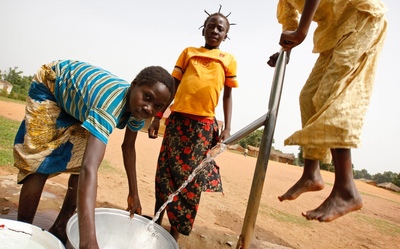Senegal’s Water Is Allegedly Being Diverted For Profit By An American Corporation
An investment company is allegedly harnessing Senegal's only lake for water to irrigate crops destined for foreign shores.
by Rafael Pena
Bloomberg reported that in the arid landscapes of West Africa, where water is as valuable as gold, a controversial venture is unfolding, drawing global attention to the ethical dilemmas of resource exploitation. As taps in coastal Dakar barely trickle, an investment company is harnessing Senegal’s only lake to irrigate crops destined for foreign shores, sparking concerns over the nation’s water security and the impact on local communities.
African Agriculture Inc., headquartered in New York City, has set its sights on cultivating 300 hectares of alfalfa within the Ndiael Special Wildlife Reserve near Saint-Louis. This ambitious project draws water from Lake Guiers, the primary freshwater reserve in Senegal. However, according to the outlet, this water source is already under strain, supplying half of Dakar’s water needs and leaving over a million residents desperate for access to running taps, especially at night.
CEO Alan Kessler defended the company’s actions, emphasizing the need for sustainable development and economic growth. “We sit at the end of the Senegal River. The alternative is the water goes out to the ocean,” he argued, pointing to plans for expansion and infrastructure development that could benefit the region. But critics, including locals and environmentalists, question the morality of exporting valuable resources while leaving communities struggling for basic necessities.
The controversy surrounding African Agriculture’s venture is not just local; it reflects broader global trends in the race for profits amid climate change challenges, according to the outlet. Large corporations are increasingly targeting African farmland, exacerbating competition for water resources between urban areas and agricultural interests. In Senegal, a World Bank report warned of a looming water crisis, with demand expected to outstrip supply in the coming decades.
“And for what? So a foreign company can sell alfalfa to feed cows and racehorses in Saudi Arabia?” asks Ousmane Aly Pame, an English literature professor at Dakar’s Cheikh Anta Diop University, according to Bloomberg. Ousmane Aly Pame runs an anti-desertification nonprofit he founded on the Senegal River. “Extracting resources and leaving Africans with no food and no future is exactly what happened in colonial times.”
The history of African Agriculture’s founder, Frank Timis, adds another layer of complexity to the narrative. With a track record spanning controversial resource deals across Africa, Timis’s involvement raises concerns about transparency. From oil exploration to mining ventures, his ventures have often been mired in allegations of corruption and environmental degradation.
Moreover, the manner in which African Agriculture acquired rights to operate within the Ndiael Reserve has raised eyebrows. Residents and government officials were caught off guard by the company’s presence, highlighting issues of land tenure and community consultation. Local herders, whose livelihoods depend on the reserve’s resources, now face displacement and restricted access to water and grazing lands.
The environmental impact of the alfalfa farm is another cause for concern. Lake Guiers, already plagued by pollution from nearby sugar cane plantations, now faces further degradation from agricultural runoff. With climate models predicting increased precipitation followed by prolonged droughts, the risk to the lake’s ecosystem and surrounding communities is heightened.
Despite these challenges, African Agriculture remains undeterred in its pursuit of profit. With plans to export alfalfa to lucrative markets in the Middle East, the company sees Senegal’s water as a strategic asset. But for those on the frontlines of the water crisis, like the residents of Dakar’s marginalized neighborhoods, access to clean water remains a daily struggle, highlighting the stark inequalities inherent in the global economy.
As the debate rages on, the fate of Senegal’s water resources hangs in the balance.












